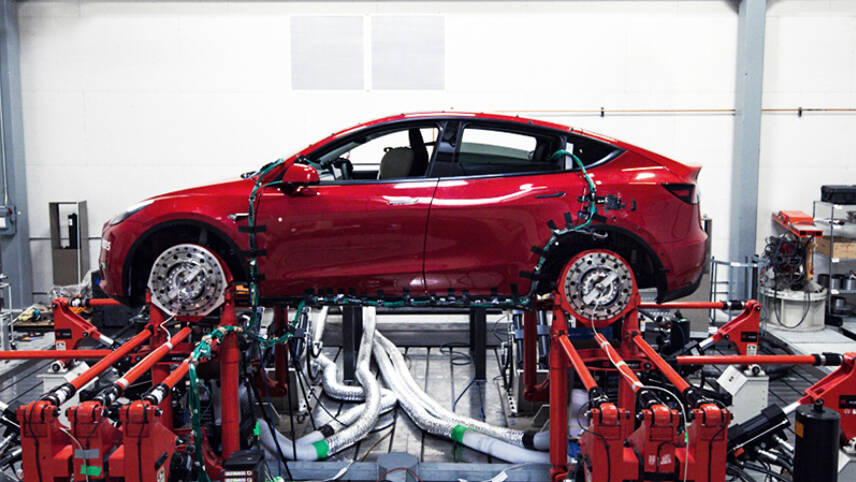Register for free and continue reading
Join our growing army of changemakers and get unlimited access to our premium content

Pictured: Manufacturing at Tesla's German plant. Image: Tesla
The electric vehicle (EV) brand has confirmed that, at a vote late last week, 63.7% of its independent shareholders voted in favour of a water risk disclosure and reduction proposal filed by As You Sow – a non-profit specialising in shareholder advocacy for better corporate governance and sustainability efforts.
As You Sow’s resolution requested regular assessment and reporting of water risk exposure and clearer details of all policies and practices to reduce this risk.
Specifically, it requested disclosures on how much water is used at each Tesla facility, plus a list of location-specific targets to reduce use. Also requested were details on water risk scarcity identification in general, and specific risk assessments for pre and post-siting processes for manufacturing locations. Additionally, the resolution pressed Tesla for water risk assessments for the supply chain.
Information about these topics should now be disclosed through CDP, which has rated Tesla with an ‘F’ grade on water disclosures for the past six years. But, as the resolution was filed in the US, it is not binding, meaning that Tesla could technically decline to disclose some information without breaking any agreement.
As You Sow filed the resolution in recognition of concerns about Tesla’s decision to open manufacturing hubs in areas affected by increasing water risk in Germany and Shanghai. Tesla’s German Gigafactory in Gruenheide, near Berlin, faced opposition from local groups over forest clearance plans and its water footprint. It is located within a drinking water protection zone and is set to consume as much water annually as a medium-sized town of 30,000 to 40,000 residents. Despite this, Tesla’s Elon Musk suggested that locals were over-reacting to the plans.
As You Sow also noted that Tesla’s older manufacturing sites in North America are not immune to water risks. The resolution names its operational and planned sites in Austin, Texas; Storey County, Nevada; and Fremont and Lathrop, California, as having poor water plans in comparison to several other automotive companies. It argued to shareholders that improper water-related planning could hamper Tesla’s ability to expand and harm its reputation in key markets.
“Tesla’s leadership has been cavalier at times when responding to localized water concerns,” said As You Sow’s president Danielle Fugere. “Every company, especially those that assert themselves as environmentally forward-thinking, should hold themselves to the highest standards of transparency and accountability regarding their resource use.”
Water figures
Tesla’s most recent environmental impact report, covering 2021, stated that the firm “must improve every metric” including the water intensity of its business. It claims that, on an intensity basis, Tesla’s German operations perform better than automakers including BMW, Ford and Stellantis.
For the supply chain, the report states that “protecting water levels and water quality” is a priority area for risk mitigation in battery supply chains.
But the absolute figures on water withdrawal are not mentioned until page 123 of the report. This page confirms that Tesla’s total water withdrawals have grown from 1.76 million cubic metres in 2019 to 2.87 million cubic metres in 2021.
The vote on the As You Sow resolution comes at a time when many parts of the world are experiencing challenges to supply chains due to hot weather that exacerbates water issues. India experienced unusually early and hot heatwaves this year, leading it to implement a wheat export ban. Northern Italy is experiencing its worst drought in 70 years, impacting supply chains for crops such as olives and rice. And, this week, France granted five nuclear power stations temporary waivers for the discharge of water inro rivers, amid poor nuclear availability due to hot weather and maintenance at other sites.
This is raising the profile of the debate about how best to enhance corporate water stewardship efforts.


Please login or Register to leave a comment.